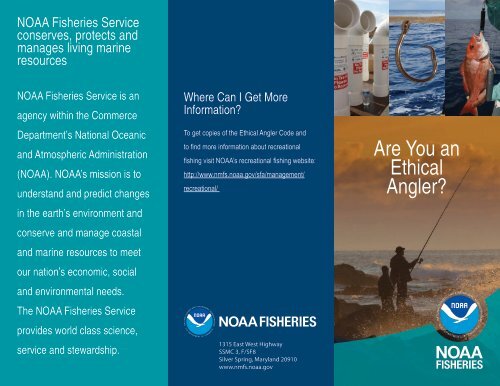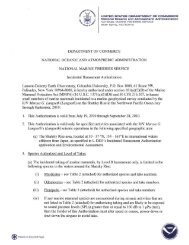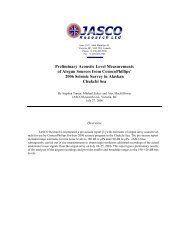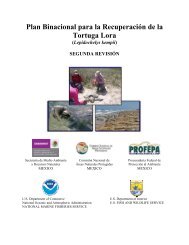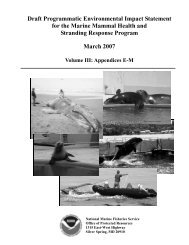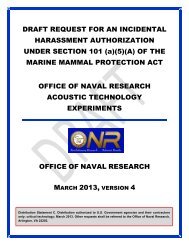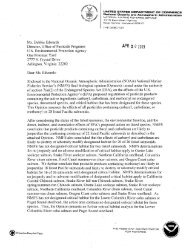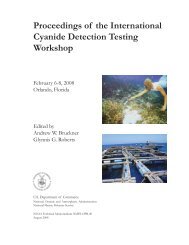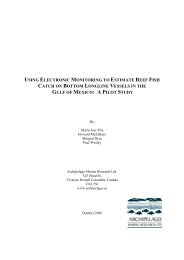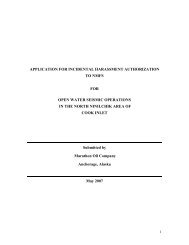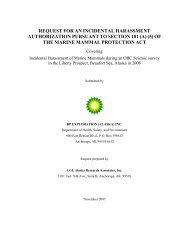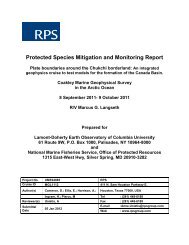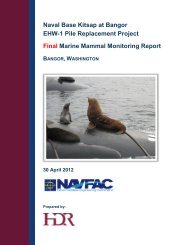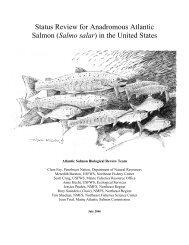Ethical Angler Code of Conduct - NOAA Fisheries
Ethical Angler Code of Conduct - NOAA Fisheries
Ethical Angler Code of Conduct - NOAA Fisheries
You also want an ePaper? Increase the reach of your titles
YUMPU automatically turns print PDFs into web optimized ePapers that Google loves.
<strong>NOAA</strong> <strong>Fisheries</strong> Service<br />
conserves, protects and<br />
manages living marine<br />
resources<br />
<strong>NOAA</strong> <strong>Fisheries</strong> Service is an<br />
agency within the Commerce<br />
Department’s National Oceanic<br />
and Atmospheric Administration<br />
(<strong>NOAA</strong>). <strong>NOAA</strong>’s mission is to<br />
understand and predict changes<br />
in the earth’s environment and<br />
conserve and manage coastal<br />
and marine resources to meet<br />
our nation’s economic, social<br />
and environmental needs.<br />
The <strong>NOAA</strong> <strong>Fisheries</strong> Service<br />
provides world class science,<br />
service and stewardship.<br />
Where Can I Get More<br />
Information?<br />
To get copies <strong>of</strong> the <strong>Ethical</strong> <strong>Angler</strong> <strong>Code</strong> and<br />
to find more information about recreational<br />
fishing visit <strong>NOAA</strong>’s recreational fishing website:<br />
http://www.nmfs.noaa.gov/sfa/management/<br />
recreational/<br />
1315 East West Highway<br />
SSMC 3, F/SF8<br />
Silver Spring, Maryland 20910<br />
www.nmfs.noaa.gov<br />
Are You an<br />
<strong>Ethical</strong><br />
<strong>Angler</strong>?
The History <strong>of</strong> the <strong>Code</strong><br />
<strong>NOAA</strong> <strong>Fisheries</strong> Service adopted a code <strong>of</strong> ethical<br />
angling as part <strong>of</strong> a public education emphasis<br />
under the <strong>NOAA</strong> Recreational <strong>Fisheries</strong> Strategic<br />
Plan. The code was developed in cooperation with<br />
a range <strong>of</strong> constituent groups, and was published<br />
in the Federal Register in 1999. The importance <strong>of</strong><br />
an angler code has been recognized and adopted by<br />
many other countries and organizations throughout<br />
the world.<br />
An ethical angler is a good steward who knows that<br />
part <strong>of</strong> the angling experience is to be in tune with<br />
nature- this means treating all wildlife with care and<br />
respect.<br />
Let’s Work Together to<br />
Preserve Our Sport<br />
Recreational fishermen are leaders in conservation.<br />
Practicing ethical angling influences other anglers<br />
and increases public awareness <strong>of</strong> the important role<br />
we all play. <strong>Ethical</strong> angler behavior-- from concern<br />
for habitat, to best practices for fish handling and<br />
release – helps spread the word that Responsible<br />
anglers are a part <strong>of</strong> the solution for sustainable<br />
resource management.<br />
The <strong>Ethical</strong> <strong>Angler</strong><br />
• Promotes ethical behavior in the use <strong>of</strong> aquatic<br />
resources<br />
• Values and respects the aquatic environment and<br />
all living things in it<br />
• Avoids spilling, and never dumps any pollutants<br />
on land or in the water<br />
• Disposes <strong>of</strong> all trash, including worn out lines,<br />
leaders, and hooks and helps to keep fishing sites<br />
litter-free.<br />
• Takes all precautionary measures necessary to<br />
prevent the spread <strong>of</strong> exotic plants and animals,<br />
including live bait fish, into non-native habitats.<br />
• Learns and obeys angling and boating regulations<br />
treating other anglers, boaters, and property owners<br />
with courtesy and respect.<br />
• Respects property rights, and never trespasses on<br />
private land or waters.<br />
• Keeps no more fish than needed for consumption,<br />
and never wastefully discards fish that are<br />
retained.<br />
• Carefully handles and releases all fish that are<br />
unwanted or prohibited by regulation, as well as<br />
other animals that are accidently hooked.<br />
Art work © Ray Troll & Terry Pyles<br />
<strong>Ethical</strong> Angling Reminders<br />
• Pay attention to restrictions on fish sizes, fishing seasons,<br />
species bag limits, and conservation measures.<br />
Proper catch and release methods may vary depending<br />
on fish species, water depth, and other factors. So<br />
make sure to plan your release strategy in advance by<br />
having available appropriate tools (dehookers, fish<br />
descenders, etc.) For some fish species circle and<br />
barbless hooks may help reduce injury and increase<br />
survival.<br />
• Landing your catch quickly will minimize exhaustion<br />
and, whenever possible, the fish should be kept in the<br />
water during hook removal. The less a fish is handled<br />
and the quicker it is released, the better likelihood it<br />
will survive.<br />
• Pay close attention to the impacts fishing activity<br />
may have on habitat. When fishing from a boat take<br />
care to avoid dragging anchors or other fishing gear<br />
on the bottom. An ethical angler should use marine<br />
sanitation devices to prevent untreated sewage from<br />
being pumped overboard.<br />
• Scan the surrounding sky, land, and water for marine<br />
mammals, seabirds and sea turtles before casting<br />
your line to reduce risk <strong>of</strong> encounter.<br />
• Minimize the hooking <strong>of</strong> seabirds and sea turtles, and<br />
treat any animals with care to avoid injury to both angler<br />
and animal. Retrieve as much line as possible to<br />
minimize entanglement and starvation <strong>of</strong> the bird or<br />
sea turtle. If possible remove the hook safely by cutting<br />
<strong>of</strong>f the barb first and then extracting. If the hook<br />
is swallowed, cut the line as closely as possible to<br />
the animal and leave the hook in place. For severely<br />
tangled or deeply hooked birds and turtles call your<br />
local game warden.<br />
• Never harm marine mammals, even if they attempt<br />
to steal the bait or catch. The law allows<br />
people to deter marine mammals not listed under<br />
the Endangered Species Act so long as the deterrence<br />
method is safe and the animal is not killed or<br />
seriously injured. The <strong>NOAA</strong> <strong>Fisheries</strong> Service has<br />
identified some potential techniques which may be<br />
used to deter problem seals and sea lions, including<br />
horns and whistles.<br />
• Feeding wildlife may harm an animal, be illegal and<br />
could change the animal’s behavior.


